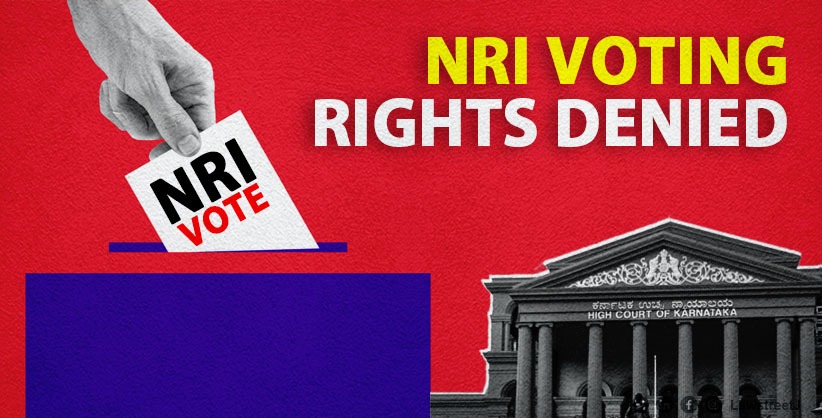The Karnataka High Court has rejected a plea to allow voting by non resident Indians, saying to direct the Election Commission to make appropriate provision to enable the NRIs to vote in the elections even whilst residing on a foreign soil, is too farfetched.
A bench of Justices Krishna S Dixit and Vijaykumar A Patil said personal presence in the booth is a sine qua non for voter to cast vote.
"Whether he (voter) should be enabled to cast his vote in absentia is, essentially a matter of legislative policy that does not fall into the domain of Judiciary," the bench said.
It also pointed out a host of factors enter the fray of such a policy making and they are largely unintelligible to judges.
"Therefore, Courts cannot direct formulation of such policies as a binding rule of conduct, in due deference to doctrine of separation of powers which is recognised as a basic feature of the Constitution," the bench added.
The court dismissed a plea by Ravi M, who hailed from Mysuru but lived in England.
The petitioner contended India being a democratic polity, periodic elections do take place and therefore, a large chunk of citizens residing in several foreign countries, as NRIs cannot be excluded from the democratic process; right to vote in the elections to the Parliament and State Legislatures should be made available to the NRIs.
He also contended that with the advanced Science and Technology, such a facility can be provided disregarding whatever arguable difficulties the Election Commission of India may have.
The counsel for the Union government opposed the plea, saying that the right to vote is a creature of law; in the absence of such a right is shown to have been created by law, prayer of the kind cannot be granted.
"To whom right to vote should be accorded is a matter of statutory policy and therefore, Writ Courts cannot intervene in the matter," the counsel said.
They also highlighted the possible difficulties of such a right being granted to the NRIs, whilst on foreign soil.
The court, after going through the scheme of laws and rules, said it does not permit an overseas elector to cast vote while on foreign soil.
"In our system, the right to vote is neither a fundamental right nor a constitutional right nor a common law right; it is a statutory right pure and simple. This right, as any other, is also not absolute; it is subject to conditions and restrictions prescribed by law," the court said.
No doubt, the right to vote is very vital to the democracy, and without that, democracy will fail to thrive; therefore, massive significance is attached to this right in the democratic jurisdictions world over, the court said.
"The law provides that only such an adult Indian citizen has a right to vote at an election in a parliamentary or assembly constituency, whose name is for the time being entered in the electoral rolls of the constituency. The electoral roll means the current electoral roll, which is in force on the last date for making nominations in the constituency," it added.







